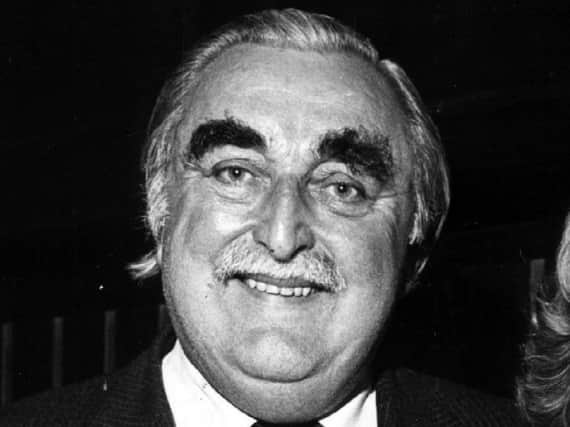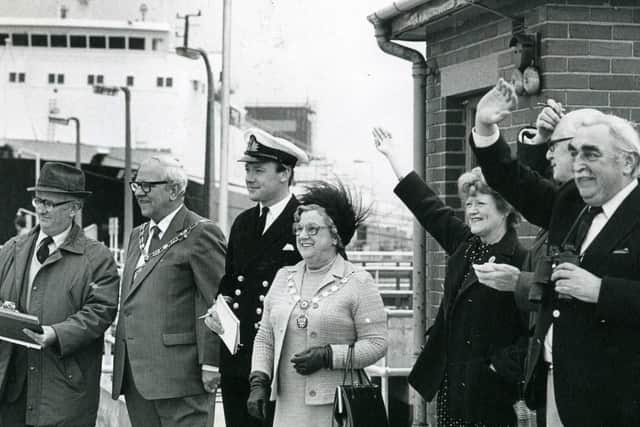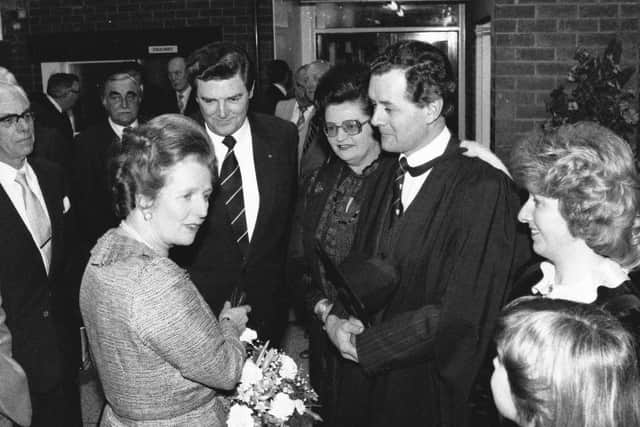Sir Walter Clegg - a Fylde man of sharp wit and deep humility


This month marks the centenary of the birth of one of the county’s finest ever ambassadors, a man once reputed to have slept each night proudly wearing his Lancashire County Cricket Club tie, the former Member of Parliament for North Fylde, Sir Walter Clegg.
Few will ever forget the chilling images of Sir Walter as he emerged in the aftermath of the bombing of the Grand Hotel in Brighton during the 1984 Conservative Party Conference, his face bleeding, his hair and bushy moustache coated in brick dust. It was an event that changed his life for ever.
Advertisement
Hide AdAdvertisement
Hide AdThe grandson of a weaver, his father a publican, Walter Clegg was born in Bury on 18th April, 1920.


Educated initially at Bury Grammar School, following the family’s move to the Fylde Coast, in 1930, Walter became a pupil at Blackpool’s Arnold School in Lytham Road. While there, excelling academically, he also developed a passion for sport, particularly cricket and rugby.
Becoming a fine debater, here he often locked horns with fellow pupil, Peter Boydell who, in later years harboured political ambitions of his own.
Leaving Arnold School in 1937, Clegg then read Law at the University of Manchester.
Advertisement
Hide AdAdvertisement
Hide AdHe was articled to the Town Clerk of Barrow-in-Furness when, like so many of his generation his seemingly effortless progress was rudely interrupted by the outbreak of the Second World War. Immediately joining the Territorial Army, he later moved to the Royal Artillery being commissioned in 1940. Subsequently serving in North Africa, he was later captured and held in prison camps in Italy and Germany. Somehow, he managed to put his time to good use by continuing his studies to become a solicitor, successfully completing them courtesy of a correspondence course while incarcerated abroad.


Following his demobilization, he returned to the resort, joining a local firm of solicitors run by a fellow veteran of the North African campaign, Charles Ingham. In the immediate post war years, he had opened offices in Talbot Road before moving to Topping Street and then Leopold Grove. The firm expanded further with Clegg on board, as he took charge of the Fleetwood branch, then as now based on North Albert Street.
Soon joining the practice was a former fighter pilot who, like Clegg, had been captured by the Germans during the conflict, John Crowther. Throughout the second half of the last century, Ingham Clegg and Crowther flourished, today it is known simply as Inghams.
Clegg first met his future wife, Elise Hargreaves when, as a reporter on this newspaper, she covered cases in the local magistrates courts. Married in 1951 and taking up residence in Raikes Road, Little Thornton, they were together for forty two years until her death in 1993. Among his many articled pupils over the years was a young Sheffield University a law graduate, Margaret Barnes. With Clegg’s encouragement she became the first woman advocate to appear at Blackpool Magistrates Court. Subsequently moving on to a successful career in chambers in London.
Advertisement
Hide AdAdvertisement
Hide AdBy now increasingly drawn into Conservative politics, Clegg served his political apprenticeship by being elected a member of Lancashire County Council. Selected to fight the 1959 General Election as the candidate for Ince near Wigan, while the Conservative’s did well, Clegg sadly did not. He managed to beat the trend of Labour victories by successfully capturing the seat seven years later and held on to what later became the Wyre constituency for twenty one years before ill health forced him to step down. A vocal and outspoken supporter of capital punishment, Clegg proved no less assiduous in support of his constituents, vigorously defending the rights of Fleetwood fishermen in their battles with Icelandic fishermen during the cod wars. He campaigned against what he called motorway blight, the closing of the five and a half mile Fleetwood to Poulton-le Fylde railway line and the Common Market. He also pressed for far more clarity and a public inquiry into the fatal stabbing of the three children in February, 1972, at Blackpool’s Victoria Hospital, killed by Jordanian eye doctor, Ahmad Alami. In Parliament having proved an effective Opposition Whip, following Edward Heath’s victory in 1970, he was soon promoted, serving as a Lord Commissioner of the Treasury from 1970 until 1972. During the third Wilson Government from March to October 1974, he went back to the Whip’s office. He was then elected to the Conservative 1922 Committee, later serving as its Treasurer.
For his last ten years in the House of Commons he served as Chairman of the Conservative North West MP’s Committee, where he reinforced his reputation as a shrewd negotiator, proving particularly adroit in his dealings with ministers. He was knighted in 1979.
In 1984, disaster struck when the IRA bombed the Grand Hotel at Brighton during that year’s party conference. Both he and his wife were badly hurt. The couple had been asleep in a bedroom immediately above the explosion. They were the first victims to be photographed after the bombing, having helped others to get clear of the collapsing building.
They had initially waved away rescuers telling them to help others more seriously wounded. Though they were later given the all clear, the couple never fully recovered from the attack.
Advertisement
Hide AdAdvertisement
Hide AdClegg left Parliament in 1987, the heart trouble that had precluded him from ministerial office. In 1992 he was elected a Freeman of the Borough of Wyre. Having lost his wife in 1993, a wheelchair bound Water Clegg died the following year, just three days short of his seventy fourth birthday. His funeral service took place at a packed Fleetwood Parish Church. Bequeathing his souvenirs of Parliament to Wyre Borough Council, he also made bequests to numerous local organisations. As a former President of Central and West Lancashire Chamber of Commerce, throughout his long years of public service, as a northerner through and through, Walter Clegg never ceased to proclaim Lancashire as the finest county that God gave to man.
A likeable and sociable man with a sharp wit and a delightful fund of funny and risqué stories, he was perhaps best captured early in his political career by one Parliamentary sketch writer, as having the bright eyes, beaked nose and eyebrows of a distinguished barn owl and the jowls of an affectionate St Bernard.
And yet despite all the many public trappings of fame, above all, it was undoubtedly his deep humility and natural goodness that shone through so brightly to bring such added distinction to a rich and fulfilling life.